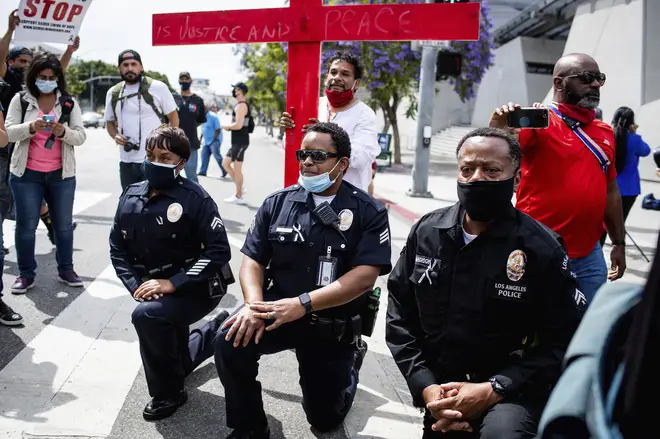
Ian Payne 4am - 7am
7 June 2020, 09:44 | Updated: 7 June 2020, 11:47

Andy George of the Black Police Association reacts to protests
Police officers showing support for anti-racism demonstrators by taking a knee may have helped deescalate tensions at protests.
Andy George is the Vice President of the National Black Police Association and he joined Andrew Castle to share his reaction to yesterday's nationwide protests to show solidarity with protesters in the USA after the death of George Floyd and demonstrate against racism in the UK.
Andrew was speaking to Dame Cressida Dick over the weekend and the commissioner said she would encourage police officers not to kneel at protests and she wouldn't take the knee herself if asked. Andrew asked Mr George if that "was that the right thing to say."
"Each force has taken a pragmatic local approach" the NBPA Vice President said. He explained to Andrew that "taking the knee is a show of support" and he personally "would support any officer that would feel the need to do that."
Mr George told Andrew that on Saturday it was seen that taking the knee "has deescalation around the crowd as well" and some scenes in the UK had shown protests go off well when officers showed support for protesters.
The officer began the conversation by stating that "tensions are high within black and ethnic minority groups at the moment" and acknowledged that because certain tensions weren't addressed "it may have led to some of the frustrations that we had seen yesterday" in London.

Andrew asked for Mr George's views on the core of the protests, which have been in part to demonstrate against police brutality. He wondered how the Black Police Association VP felt about representing the police when people demonstrate against police abuses. He told Andrew that "it's about engaging with people" and accepted that "disproportionalities still exist within policing."
Andrew delved deeper into these disproportionalities and asked about institutional racism within the police force. Mr George noted that the police have "zero tolerance" for racism but accepted that he has seen "officers that are accused and found guilty" of racism.
He went further to point out that he has noticed that many of these culprits that are found guilty are not punished the same way as their black or ethnic minority counterparts, which becomes an issue when these people are allowed to continue operating as police officers. Andrew played devil's advocate with Mr George and asked if some workplace banter could be misinterpreted as racism.
Andy George quashed the idea that workplace banter and racism could be mistaken for one another, telling Andrew that "for some individuals it could be quite traumatic" and also "reinforces belief that some officers are racist." He noted that such dynamics are dangerous to be left unaddressed as again, these officers go out into the community to enforce the law amongst minorities.
Listen & subscribe: Global Player | Apple Podcasts | Google Podcasts | Spotify